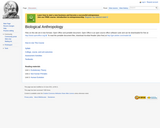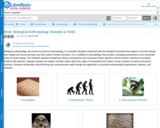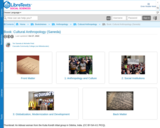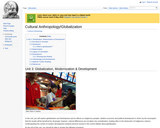
How this course is intended to be used: This course is set up to be used as either fully online, face-to-face (f2f), or hybrid. Note that the course outcomes and some assessments have variations available for each type of course (e.g., Public Awareness Campaign, Dancing Skeletons Essay & Discussion)
Resources for this course:
OER resources: The majority of materials used in this course are OER and can be found via this page (under Course Modules).
Paid resources: Only one small textbook is suggested for the course, the ethnography Dancing Skeletons: Life and Death in West Africa by Katharine Dettwyler (ISBN-10: 088133748X). It's approximately $13.00 new and can be found for approximately $5.00 used. It's used for the Unit 3 assessment, Dancing Skeletons Essay & Discussion. We think that it's an integral part of the course, due to its focus on human biology and biocultural/environmental interactions. It also provides an excellent portrayal of an anthropologist's experience in the field. If you require additional or alternate textbooks, we have put together a list of texts available for around $30.
Explanation of approach: As you peruse the reading material in the course module pages you might find that they contain less detail than what you would see in a "normal" textbook. This is intentional. One thing we find incredible about higher education is that the student often reads the textbook only to go into class and have the professor lecture for two hours on the exact same material. Because of this repetition of the material, students often become exasperated and either stop reading the material or stop paying attention in class. We've also found that students in the introductory anthropology courses frequently struggle with picking out the basic concepts from among the myriad of material from the textbook. We think that students in introductory anthropology courses such as this one, most of whom are not going to be anthropology majors, should read the basic information outside of class. This allows the instructor to focus on providing more explanatory details and help students work through critical thinking about the material in class. Therefore, the readings in the course modules have the basic information. Through in-class activities, discussions, and homework assignments, the job of the instructor is to help students move deeper into and synthesize the material.
- Subject:
- Anthropology
- Social Science
- Material Type:
- Full Course
- Author:
- Tori Saneda
- Michelle Field
- Date Added:
- 11/05/2019


